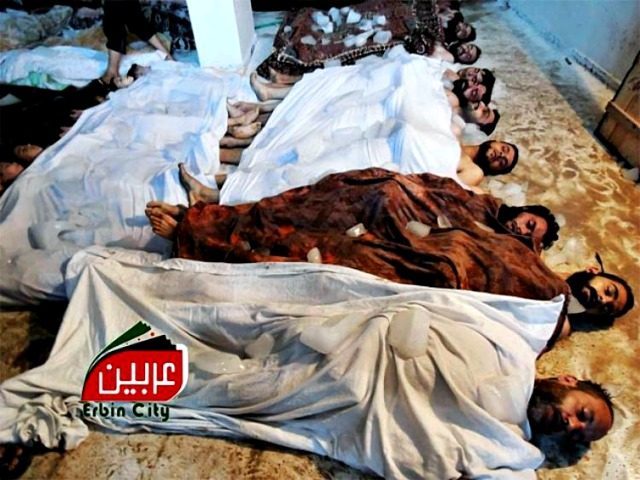A survivor of an Aug. 21, 2013 Sarin gas attack on his village called “Moadhamiyeh” in West Damascus, Syria told Breitbart News he is grateful for President Donald Trump’s strike against the Syrian military, which is a complete turnaround from President Barack Obama’s puzzling acceptance of President Bashar Assad and his regime.
“I want to tell President Trump with all my heart: Mr. President, as a Syrian and as a chemical weapon survivor, I want to thank you for taking action against the dictator, who has been killing us for more than six years,” said Kassem Eid, who spoke to Breitbart News from his home in Germany.
Eid was the subject of a 2015 60 Minutes report by Scott Pelley.
The chemical attack was delivered by missiles from Damascus, he said.
“My heart stopped as I was helping people. I was in a coma. My body was placed next to a bunch of dead bodies,” he said.
“Fortunately, my friends saw me move slightly and they called over a doctor,” he said. “They gave me more Atropine and gave me CPR and washed my body over and over with water until I came back as conscious.”
Before the chemical attack, the Syrian air force was bombing the town, he said.
“Suddenly, I started to hear strange sounds,” he said.
“They were the missiles coming from Damascus,” he said. “After two years of shelling and bombardment, you get to know which type of weapon you are getting hit with. This noise was a new and strange voice. The missiles were flying a low distance to the ground, like a small air jet flying off the ground. A few seconds later the missiles hit the ground and they did not make an explosion.”
Everyone was expecting an explosion, so everyone was confused, he said.
“I was looking from the window to see what was going on and I lost my ability to breathe,” Eid said.
“I felt my chest set on fire. My eyes were burning. I had an unbearable feeling of pain all over my body and my stomach. I couldn’t scream or do anything to alert my friends. I started beating my chest. That was my normal reaction to beat my chest as hard I can to get a single breath,” he said.
“Then, the neighbors started waking up screaming. Everyone was screaming. I went downstairs and went out and saw what I could only describe as Judgement Day,” he said. “There was panic and terror, but not a single drop of blood.”
Eid came to America after his village was attacked to tell Congress and the American people what was happening in his country. In 2014, he quit his activism in the United States and focused on Europe.
Beginning in 2011, Eid and his neighbors were under constant barrage, in addition to the one chemical weapon attack, he said.
“I survived more than two-and-a-half years of life under siege and bombardment by the Assad regime,” he said. “We had to survive on eating rats for more than a year, because of the government-enforced siege–the daily bombardment by tanks, planes, mortars.”
Eid said people in his village were part of the original uprising against the regime in 2011, before the emergence of the Islamic State when the armed force protecting his village was not tied to a religious or cultural faction.
“The local fighters were from our own town, most of the officers were defectors who refused commands to shoot at peaceful protesters,” he said. “They were students and teachers and some of them were even doctors–normal people, who just wanted to defend themselves.”
During the fighting, when the Syrian Army was pressing to invade the village, there were brutal crimes, such as rapes, burning individuals alive, and gutting people with knives, he said.
Assad’s crimes were deliberate, so he could manufacture a refugee crisis that would force the Western governments to negotiate with him, he said.
“I think Obama made a terrible mistake by not punishing Assad and not making sure, 100 percent, that Assad delivered all of his chemical weapons,” he said.
“Obama was very easy on Assad in a way that raised a lot of questions and a lot of–I don’t know–doubts about the true intentions of leaving someone like Assad–committing such horrible crimes–unpunished,” he said.

COMMENTS
Please let us know if you're having issues with commenting.